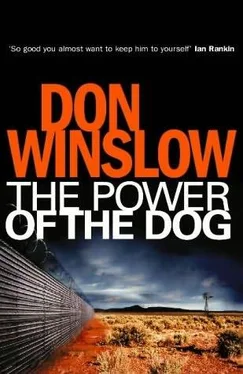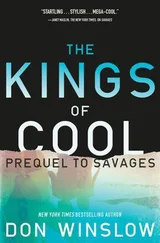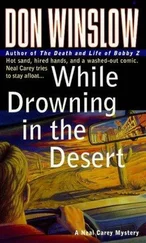Don Winslow - The Power of the Dog
Здесь есть возможность читать онлайн «Don Winslow - The Power of the Dog» весь текст электронной книги совершенно бесплатно (целиком полную версию без сокращений). В некоторых случаях можно слушать аудио, скачать через торрент в формате fb2 и присутствует краткое содержание. Жанр: Триллер, на английском языке. Описание произведения, (предисловие) а так же отзывы посетителей доступны на портале библиотеки ЛибКат.
- Название:The Power of the Dog
- Автор:
- Жанр:
- Год:неизвестен
- ISBN:нет данных
- Рейтинг книги:3 / 5. Голосов: 1
-
Избранное:Добавить в избранное
- Отзывы:
-
Ваша оценка:
- 60
- 1
- 2
- 3
- 4
- 5
The Power of the Dog: краткое содержание, описание и аннотация
Предлагаем к чтению аннотацию, описание, краткое содержание или предисловие (зависит от того, что написал сам автор книги «The Power of the Dog»). Если вы не нашли необходимую информацию о книге — напишите в комментариях, мы постараемся отыскать её.
The Power of the Dog — читать онлайн бесплатно полную книгу (весь текст) целиком
Ниже представлен текст книги, разбитый по страницам. Система сохранения места последней прочитанной страницы, позволяет с удобством читать онлайн бесплатно книгу «The Power of the Dog», без необходимости каждый раз заново искать на чём Вы остановились. Поставьте закладку, и сможете в любой момент перейти на страницу, на которой закончили чтение.
Интервал:
Закладка:
And me, Art thinks. If I really want to be honest about it, Tio Barrera is running me.
The twelve weeks of DEA training weren’t that hard. The PT was a breeze-Art could easily run the three-mile course and play basketball, and the self-defense component was unsophisticated compared with Langley. The instructors just had them wrestle and box, and Art had finished third in the San Diego Golden Gloves as a kid.
He was a mediocre middleweight with good technique but slow hands. He found out the hard truth that you can’t learn speed. He was just good enough to get into the upper ranks, where he could really get beat up. But he showed he could take it, and that was his ticket as a mixed-race kid in the barrio. Mexican fight fans have more respect for what a fighter can take than for what he can dish out.
And Art could take it.
After he started boxing, the Mexican kids pretty much left him alone. Even the gangs backed off him.
In the DEA training sessions he made it a point to take it easy on his opponents in the ring, though. There was no point in beating someone up and making an enemy just to show off.
The law enforcement-procedure classes were tougher, but he got through them all right, and the drug training was pretty easy, questions like, Can you identify marijuana? Can you identify heroin? Art resisted the impulse to answer that he always could at home.
The other temptation he resisted was to finish first in his class. He could have, knew he could have, but decided to fly under the radar. The law enforcement guys already felt that the Company types were trespassing on their turf, so it was better to walk lightly.
So he took it a little easy in the physical training, kept quiet in class, punted a few questions on the tests. He did enough to do well, to pass, but not enough to shine. It was a little harder to be cool in the field training. Surveillance practice? Old hat. Hidden cameras, mikes, bugs? He could install them in his sleep. Clandestine meetings, dead drops, live drops, cultivating a source, interrogating a suspect, gathering intelligence, analyzing data? He could have taught the course.
He kept his mouth shut, graduated, and was declared a Special Agent of the DEA. They gave him a two-week vacation and sent him straight to Mexico.
Right to Culiacan.
The capital of the Western Hemisphere drug trade.
Opium’s market town.
The belly of the beast.
His new boss gave him a friendly greeting. Tim Taylor, the Culiacan RAC (Resident Agent in Charge) had already perused Art’s shield and seen through the transparent screen. He didn’t even look up from the file. Art was sitting across from his desk and the guy said, “Vietnam?”
“Yup.”
“ 'Accelerated Pacification Program’…”
“Yup.” Accelerated Pacification Program, aka Operation Phoenix. The old joke being that a lot of guys got peaceful in a hurry.
“CIA,” Taylor said, and it wasn’t a question, it was a statement.
Question or statement, Art didn’t answer it. He knew the book on Taylor-he was an old BNDD guy who’d lived through the low-budget bad days. Now that drugs were a fat priority, he didn’t intend to lose his hard-earned gains to a bunch of new kids on the block.
“You know what I don’t like about you Company Cowboys?” Taylor asked.
“No, what?”
“You aren’t cops,” Taylor said. “You’re killers.”
And fuck you, too, Art thought. But he kept his mouth shut. Kept it firmly clamped while Taylor launched into a lecture about how he didn’t want any cowboy shit from Art. How they’re a “team” here and Art better be a “team player” and “play by the rules.”
Art would have been happy to be a team player if they would have let him on the team. Not that Art cared one hell of a lot. You grow up in the barrio as the son of an Anglo father and a Mexican mother, you’re not on anybody’s team.
Art’s father was a San Diego businessman who seduced a Mexican girl while on vacation in Mazatlan. (Art often thought it was funny that he was conceived, albeit not born, in Sinaloa.) Art Senior decided to do the right thing and marry the girl-not too painful an option, as she was a raving beauty; Art gets his good looks from his mother’s side. His father brings her back to the States, only to decide that she’s like a lot of things you get in Mexico on vacation-she looked a lot better on a moonlit beach in Mazatlan than in the cold, Anglo light of the American day-to-day.
Art Senior dumped her when Art was about a year old. She didn’t want to throw away the one advantage her son had in life-U.S. citizenship-so she moved in with some distant relations in Barrio Logan. Art knew who his father was-sometimes he’d sit in the little park on Crosby Street and look at the tall glass buildings downtown and imagine going into one of them to see his father.
But he didn’t.
Art Senior sent checks-faithfully at first and then sporadically-and he’d get occasional bouts of paternal urges or guilt and show up to take Art to dinner or maybe a Padres game. But their father-son time was awkward and forced, and by the time Art was in junior high the visits had stopped altogether.
Ditto the money.
So it was no easy thing when the seventeen-year-old Art finally made the trip downtown, marched into one of those tall glass buildings, strode into his father’s office, laid his killer SAT scores and UCLA acceptance letter on his desk and said, “Don’t freak out. All I want from you is a check.”
He got it.
Once a year for four years.
He got the lesson, too: YOYO.
You’re On Your Own.
Which was a good lesson to learn because the DEA just chucked him into Culiacan, virtually on his own. “Just get the lay of the land” is what Taylor told him at the start of a cliche-fest that also included “Get your feet wet,” “Easy does it” and, honest to God, “Failing to prepare is preparing to fail.”
It should have included “And go fuck yourself,” because that was the thrust of it. Taylor and the cop types totally isolated him, kept info from him, wouldn’t introduce him to contacts, froze him out on meetings with the local Mexican cops, didn’t include him in the morning coffee-and-doughnut bullshit or the sundown beer sessions where the real information was passed.
He was fucked from jump street.
The local Mexicans weren’t going to talk to him because as a Yanqui in Culiacan he could only be one of two things-a drug dealer or a narc. He wasn’t a drug dealer because he wasn’t buying anything (Taylor wouldn’t free up any money; he didn’t want Art fucking up anything they already had going), so he had to be a narc.
The Culiacan police wouldn’t have anything to do with him because he was a Yanqui narc who should stay home and mind his own business, and besides, most of them were on Don Pedro Aviles’s payroll anyway. The Sinaloa state cops wouldn’t deal with him for the same reasons, with the additional rationale that if Keller’s own DEA wouldn’t work with him, why should they?
Not that the team was doing much better.
The DEA had been hammering on the Mexican government for two years, trying to get them to move against the gomeros. The agents brought evidence-photos, tapes, witnesses-only to have the federales promise to move right away and then not move, only to hear, “This is Mexico, senores. These things take time.”
While the evidence grew stale, the witnesses got scared and the federales rotated posts so that the Americans had to start all over again with a different federal cop, who told them to bring him solid evidence, bring him witnesses. Who, when they did, looked at them with perfect condescension and told them, “Senores, this is Mexico. These things take time.”
While the heroin flowed down from the hills into Culiacan like mud in a spring thaw, the young gomeros slugged it out with Don Pedro’s forces on a nightly basis until the city sounded to Art like Danang or Saigon, only with a lot more gunfire.
Читать дальшеИнтервал:
Закладка:
Похожие книги на «The Power of the Dog»
Представляем Вашему вниманию похожие книги на «The Power of the Dog» списком для выбора. Мы отобрали схожую по названию и смыслу литературу в надежде предоставить читателям больше вариантов отыскать новые, интересные, ещё непрочитанные произведения.
Обсуждение, отзывы о книге «The Power of the Dog» и просто собственные мнения читателей. Оставьте ваши комментарии, напишите, что Вы думаете о произведении, его смысле или главных героях. Укажите что конкретно понравилось, а что нет, и почему Вы так считаете.












